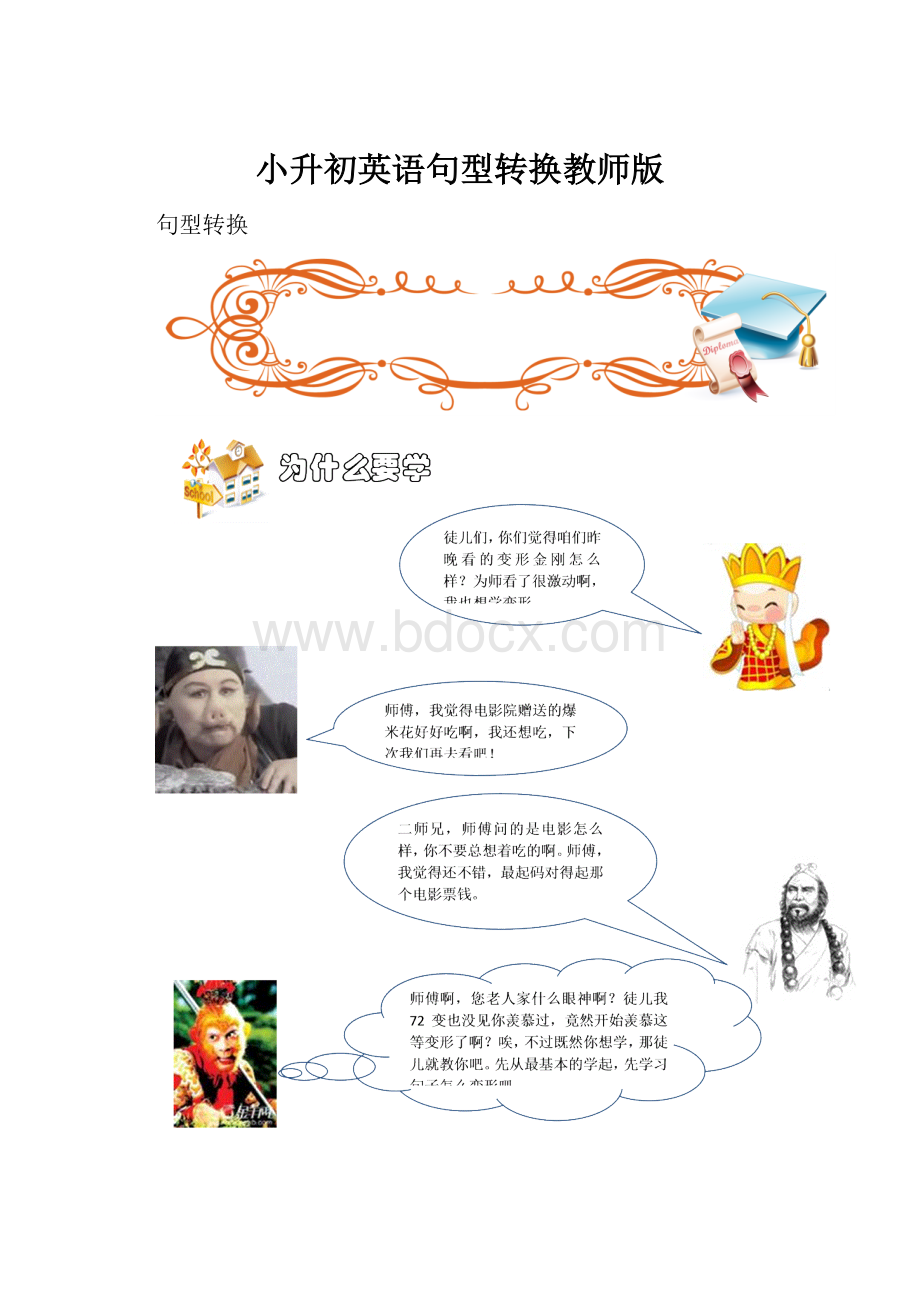小升初英语句型转换教师版.docx
《小升初英语句型转换教师版.docx》由会员分享,可在线阅读,更多相关《小升初英语句型转换教师版.docx(31页珍藏版)》请在冰豆网上搜索。

小升初英语句型转换教师版
句型转换
Part1句型转换
一、如何变否定句
句子变否定句时分为两种情况:
有助动词和无助动词。
1.有助动词的句子
有助动词的句子变为否定句时,直接在助动词后加not。
常见的助动词有be动词、情态动词、have等。
特别注意:
some在否定句中要变为any,too变为either,already变为yet。
Exercise1
按要求进行句型转换。
1.ThesephotosweretakenontheGreatWall.(改为否定句)
2.WewerehavingaPEclassatfouryesterdayafternoon.(改为否定句)
3.Therearesomecomputerroom.(改为否定句)
4. Lilyhasalreadyreadthisnewbook.(改为否定句)
5.Thebikehasalreadybeenmended.(改为否定句)
Keys:
1.ThesephotoswerenottakenontheGreatWall.
2.WewerenothavingaPEclassatfouryesterdayafternoon.
3.Therearenotanycomputerroom.
4.Lilyhasnotreadthisnewbookyet.
5.Thebikehasnotbeenmendedyet.
2.没有助动词的句子
没有助动词的句子,一般情况下要借用助动词do的相应形式来表达。
注意:
原句中的谓语动词要还原成原形。
如:
Shehassomebooks.–Shedoesn’thaveanybooks.
Iwenttoschoolyesterday.–Ididn’tgotoschoolyesterday.
Exercise2
1.1watchedTVlastnight.(改为否定句)
I_____________TVlastnight.
2.Thewomancleansthetoileteverymorning.(改为否定句)
Thewoman_________________thetoileteverymorning.
Keys:
1.didn;twatch
2.doesn’tclean
3.特殊情况
(1)祈使句变否定句时,直接在句子前面加Don’t即可。
如:
Openthedoor,please.—Don’topenthedoor,please.
(2)某些词汇可以直接变为其反义词:
both—neither,all-none等。
注意:
谓语动词的单复数要做相应变化。
如:
BothofmyparentslikewatchingTV.–NeitherofmyparentslikeswatchingTV.
(3)特殊情况。
某些句式变为否定句时有自己独特的方式,需要我们特殊记忆。
如:
Ithinkheisstrong.–Idon’tthinkheisstrong.
You’dbettergonow.–You’dbetternotgonow.
Exercise3
1.BothmyfatherandIaregoingtoBeijingnextweek.(变为否定句)
myfatherIgoingtoBeijingnextweek.
2.Openthedoor,please.(改为否定句)
3.You’dbettergotoseehimoffattherailwaystation.(改为否定句)
You’dbetter________________toseehimoffattherailwaystation.
4.Bothofthetwinslikemooncakeswitheggsinthem.(改为否定句)
ofthetwinsmooncakeswitheggsinthem.
Keys:
1.Neithernoram
2.Pleasedon’topenthedoor.
3.notgo
4.Neitherlikes
二、如何变一般疑问句
一般疑问句是至没有特殊疑问词的疑问句,翻译成汉语时常为“……吗?
”
句子变一般疑问句时也分为两种情况:
有助动词和无助动词。
1.有助动词的句子
有助动词的句子变为一般疑问句时,直接将助动词提前即可。
注意:
有些句子需要转换人称,因此谓语动词也要发生相应的改变。
如:
IcouldswimwhenIwasfiveyearsold.–Couldyouswimwhenyouwerefiveyearsold?
Exercise4
1.Katewasreviewingherlessonsateightlastnight.(改为一般疑问句)
2.TheGreenswillhavedinneratseveno’clock.(改为一般疑问句)
3.IwillbefreethisSunday.(改为一般疑问句)
4.IshallleaveforAmericatomorrow.(改为一般疑问句)
5.Russianisalsotaughtintheirschool.(改为一般疑问句)
Keys:
1.WasKatereviewingherlessonsateightlastnight?
2.WilltheGreenshavedinneratseveno’clock?
3.WillyoubefreethisSunday?
4.WillyouleaveforAmericatomorrow?
5.IsRussianalsotaughtintheirschool?
2.没有助动词的句子
没有助动词的句子,一般情况下要借用助动词do的相应形式来表达。
注意:
原句中的谓语动词要还原成原形。
如:
Helikesplayingbasketball.–Doeshelikeplayingbasketball?
TheywentttheGreatWalllastweek.–DidtheygototheGreatWalllastweek?
Exercise5
1.Katehelpshermotherwithhousework.(改成一般疑问句)
2.Hehasacomputer.(改为一般疑问句)
3.Edisonbuiltasciencelabhimselfwhenhewasten.(改成一般疑问句)
______Edison______asciencelabhimselfwhenhewasten?
4.Sheoftendoesherhomeworkafterschoo1.(改为一般疑问句)
______sheoften_____herhomeworkafterschool?
5.Thechairmansaidsomethingatthemeeting.(改为一般疑问句)
_______thechairman_______ _____atthemeting?
6.John’sdonehishomeworkfor4hours.(改为一般疑问句)
_____________John____________hishomeworkfor4hours?
Keys:
1.DoesKatehelphermotherwithhousework?
2.Doeshehaveacomputer?
3.Didbuild
4.Doesdo
5.Didsayanything
6.Hasdone
三、对于一般疑问句的回答
一般疑问句的回答较为简单,一般只有三个部分组成:
Yes/No;主语+助动词。
如:
Areyouhungry?
–Yes,Iam.Isthisyourpen?
–No,itisn’t.
Exercise6
1.Katewasreviewingherlessonsateightlastnight.(改为一般疑问句并作肯定回答)
2.TheGreenswillhavedinneratseveno’clock.(改为一般疑问句并作肯定回答)
3.Katehelpshermotherwithhousework.(改成一般疑问句并作否定回答)
Keys:
1.WasKatereviewingherlessonsateightlastnight?
Yes,shewas.
2.WilltheGreenshavedinneratseveno’clock?
Yes,theywill.
3.DoesKatehelphermotherwithhousework?
No,shedoesn’t.
四、如何变特殊疑问句
1.对主语进行提问
如果主语是人,则用who提问,后加一般疑问句;如果主语是物,则用what提问,后加一般疑问句。
如:
Myuncleisapoliceman.(对划线部分进行提问)–Whoisapoliceman?
Mychairisgreen.(对划线部分进行提问)–Whatcolorisyourchair?
Exercise7
1.Mychairisgreen.(就划线部分提问)
2.Thestarscan’tbeseeninthedaytime.(对划线部分进行提问)
3.Charlieisgoingtoworkherenextmonth.(对划线部分提问)
4.Jenniferhasapairofearrings.(划线提问)
Keys:
1.Whatisgreen?
2.Whatcan’tbeseeninthedaytime?
3.Whoisgoingtoworkherenextmonth?
4.Whohasapairofearrings?
2.对谓语/表语进行提问
用what进行提问,后加一般疑问句。
Heisclimbingthetree.–Whatishedoing?
Shedidherhomeworkyesterday.–Whatdidhedoyesterday?
Exercise8
1.Thescientistgaveatalkyesterday.(划线提问)
thescientistyesterday?
2.Theywereplayingchessatninelastnight.(对划线部分提问)
3.Yourbrotherwillborrowamagazinefromthelibrarynextweek.(对划线部分提问)
4.Shetakesashowereveryday.(划线部分提问)
5.Wehaveaclassmeetingonceaweek.(对划线部分提问)
_______________doyouhaveaclassmeeting?
6.LiPing'smotherisanurse.(就画线部分提问)
7.Theweatherhereiswetandcold.(对画线部分提问)
theweatherhere?
Keys:
1.Whatdiddo
2.Whatweretheydoinglastnight?
3.Whatwillyourbrotherdonextweek?
4.Whatdoesshedoeveryday?
5.Howoften
6.WhatisLiPing’smother?
7.What’slike
3.对宾语进行提问
当宾语为物时,用what进行提问,后加一般疑问句;当宾语为地点时,用where进行提问,后加一般疑问句。
Exercise9
1.Iwasreadinganovelatthreeyesterdayafternoon.(对划线部分提问)
2.Theyhavenicekites.(划线部分提问)
3.I'mlookingformypen.(就画线部分提问)
4.We’llvisitthemuseumnextweek.(对划线部分提问)
Keys:
1.Whatwereyoureadingatthreeyesterdayafternoon?
2.Whatdotheyhave?
3.Whatareyoulookingfor?
4.Wherewillyouvisitnextweek?
4.对状语进行提问
对地点状语提问用where,后加一般疑问句;对原因提问用why,后加一般疑问句;对时间提问时分两种情况:
对时间点提问时用when,对时间段提问时用Howlong等;对频率提问用howoften;对数量提问用howmany或howmuch.
Exercise10
1.Wehadhadthetoysfortenyearsbeforewegavethemtothechild.(对划线部分提问)
__________________hadyouhadtoysbeforeyougavethemtothechild?
2.Theyhavebeenheresince2000.(对划线部分提问)
__________________havetheybeenhere?
3.TheyusuallygoswimmingintherivernearTom’shouseonSundays.(划线提问)
theyusuallygoswimmingonSundays?
4.Themonkeysleepsatnight.(划线提问)
themonkeysleep?
5.Thechildrenareplayinggamesnearthehouse.(就划线部分提问)
6.XiaoChengdidn'tgotothefarmwithusbecausehewasill.(划线提问)
____________XiaoChenggotothefarmwithus?
Keys:
1.Howlong
2.Howlong
3.Wheredo
4.Whendo
5.Wherearethechildrenplayinggames?
6.Whydidn’t
五、将句子改为反义疑问句
反义疑问句(TheDisjunctiveQuestion)表示提问人的看法,没有把握,需要对方证实。
反义疑问句由两部分组成:
前一部分是一个陈述句,后一部分是一个简短的疑问句,两部分的人称时态应保持一致。
反义疑问句有两种句型:
1.陈述部分肯定式+疑问部分否定式可记为前肯后否定
2.陈述部分否定式+疑问部分肯定式可记为前否后肯定
如:
Theyworkhard,don’tthey?
需要注意的是当陈述部分有never,seldom,hardly,few,little,nothing,none,rarely等否定意义的词汇时,后面的反意疑问句则为肯定形式:
如:
Therearefewapplesinthebasket,arethere?
Hecanhardlyswim,canhe?
Theyseldomcomelate,dothey?
3.需要注意的词汇:
have/has。
这个词既可以做实义动词,也可以做助动词,做题时要分清楚。
如:
Hehashishaircut,doesn’the?
Hehasn’tbeentotheUSA,hashe?
Exercise11
将下列句子改为反义疑问句。
1.YourmotherteachesChinese,______________?
2.He’sneverseenthefilmbefore,__________________?
3.There’snotimetogoshopping,?
4.Lucy’schangedhermind._____she?
5.Peterhastoseeadoctor,?
6.Hecouldhardlywait,?
7.Yourfatherisaworker,?
8.We'regoingtohaveameetingthisweek,?
9.Theyalllookfine,?
10.Kateswimsthebestinherclass,?
Keys:
1.doesn;tshe
2.hashe
3.isthere
4.hasn’tshe
5.doesn;the
6.couldhe
7.isn;the
8.aren’twe
9.don’tthey
10.doesn;tshe
六、将句子改为单数/复数
这类题目其实主要是考察主谓一致。
主语变为复数时,谓语动词也要发生相应的变化;主语变为单数时,谓语动词也要跟着发生变化。
此类题型尤其以therebe句型为常见。
如:
Thereisabookonthedesk.–Therearesomebooksonthedesk.
Exercise12
1.Therearesomeapplesonthetree.(主语改成单数,重写句子)
2.Heisapoliceman.(改为复数形式)
3.What’sthat?
It’sasheep.(改为复数形式)
4.Thereisawomanunderthetree.(改为复数形式)
5.Therearesomeoldsheeponthefarm.(改为单数形式)
There_______________old_______onthefarm.
Keys:
1.Thereisanappleinthetree.
2.Theyarepolicemen.
3.Whatarethose?
Theyaresheep.
4.Therearesomewomenunderthetree.
5.isansheep
七、将句子改为感叹句
做这类题目时只要将感叹句的中心句型记住就可以。
感叹句从大体上来讲可以分为两类:
由what引导的感叹句和由how引导的感叹句。
1.由感叹词what引导的感叹句。
what修饰名词或名词短语,有以下两种形式:
(1)What+a(an)+(形容词)+单数可数名词+主语+谓语!
或是:
What+名词词组+主语+谓语!
如:
Whatafinedayitis!
(2)What+(形容词)+可数名词复数或不可数名词+主语+谓语!
Whatkindwomentheyare!
Whatnicemusicitis!
2.由How引导的感叹句。
how用来修饰形容词、副词或动词。
其结构是:
How+形容词(副词)+主语+谓语!
Howhardtheworkersareworking!
Howcleverthegirlis!
Howquicklytheboyiswriting!
注意:
当how修饰动词时,动词不跟着感叹词提到主语之前。
Howfasttherunnerruns!
what与how引导的感叹句,一般情况下可以相互转换,转换后意义不变。
(具体见下)如:
Whataninterestingstoryitis!
==Howinterestingthestoryis!
whatabeautifulbuildingitis!
==Howbeautifulthebuildingis!
Exercise13
1.Kateisdoingherhomeworkverycarefully.(改为感叹句)
______________________Kateisdoingherhomework!
2.